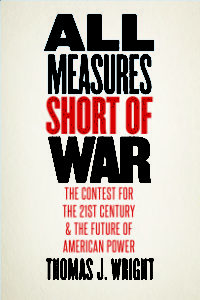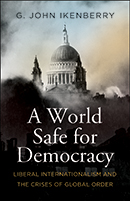An insightful new paper from Brookings analyst Thomas Wright examines the debate between restorationists (who would continue the Obama Administration’s foreign policy approach) and reformers (who would challenge key elements of it) — and how that plays out on China, foreign economic policy, the Middle East, and democracy.
The reformers want the United States to adopt a much more competitive strategy towards China than the Obama administration, he writes for the Lowy Institute. Both camps seek to enhance cooperation between democracies, beginning with a summit of democracies, modelled on the Nuclear Security Summit, in which members commit to strengthen democracy at home and overseas, but there are also key differences, adds Wright,  the author of “All Measures Short of War: The Contest For the 21st Century and the Future of American Power“:
the author of “All Measures Short of War: The Contest For the 21st Century and the Future of American Power“:
- The reformers see democracy versus authoritarianism as a fault-line in world politics, a view they share with the progressives. They want the United States to make democratic cooperation an organising principle of its foreign policy, partly as a means of competing with China, and partly because they believe that democracy itself is at grave risk. They want democracies to become collectively resilient, including partially decoupling from authoritarian countries. They want to work with other free societies to promote liberal norms and to compete with China and Russia in international institutions.
- Restorationists, on the other hand, worry about creating an ideological fault-line in world politics that exacerbates competition with China. They see cooperation among democracies as just one piece of a larger diplomatic strategy. They tend to be more optimistic about the fate of democracy in the medium to long term. They will certainly support democracy, but they do not necessarily see it as an organising principle. RTWT
 For two hundred years, the grand project of liberal internationalism has been to build a world order that is open, loosely rules-based, and oriented toward progressive ideas, Princeton’s G. John Ikenberry contends (above), Today this project is in crisis, threatened from the outside by illiberal challengers and from the inside by nationalist-populist movements, he writes in A World Safe for Democracy.
For two hundred years, the grand project of liberal internationalism has been to build a world order that is open, loosely rules-based, and oriented toward progressive ideas, Princeton’s G. John Ikenberry contends (above), Today this project is in crisis, threatened from the outside by illiberal challengers and from the inside by nationalist-populist movements, he writes in A World Safe for Democracy.
An upcoming webinar at the University of Virginia College of Arts and Sciences will focus on the current state of U.S. foreign policy. The webinar – Democracy and Strategy: American Statecraft in the 21st Century – will take place Oct. 8 at 1 p.m. with the UVA Democracy Initiative’s Democratic Statecraft Lab.
NPR’s Mary-Louise Kelly will moderate a debate between New America’s Anne-Marie Slaughter and Harvard’s Stephen Walt about America’s role in the world. Kelly will then talk about challenges from Russia with Michael McFaul, a former U.S. Ambassador to Russia and former NED Reagan-Fascell fellow. To register for the webinar, click here.







